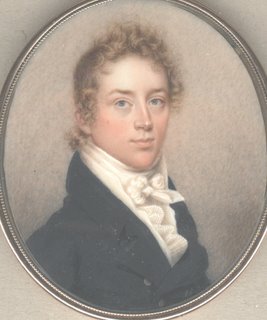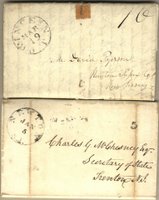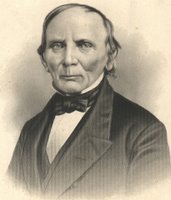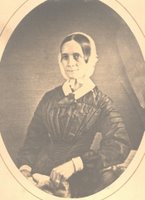 Nathaniel Rogers (1787-1844) of New York painted this miniature portrait of David Ryerson of Newton NJ.
Nathaniel Rogers (1787-1844) of New York painted this miniature portrait of David Ryerson of Newton NJ.The style of the portrait and the case work are both very similar to the portrait that Rogers painted of Matilda Few (see figure 192 in Johnson).
David Ryerson (1781-1867) married Mary Linn (1792-1851) on Dec 5, 1815. He was president of the Sussex Bank from (1831-1865) and a member of the State Council of New Jersey (1829-1835). He was the son of Martin, Jr., and Rhoda (Hull) Ryerson, was born Oct. 9, 1781, and spent his early life on the farm. He died Jan. 21, 1867. He purchased extensive tracts of land of non-resident owners, divided them into farms, and sold the latter to individuals at moderate prices, giving them long terms wherein to make payment. By this process waste lands were improved and plodding tenants were transformed into independent farmers. For 26 years he was Treasurer of Sussex Co., and from 183 1 to 1865 he was President of the Sussex Bank. From 1829 to 1835 he was a member of the State Council (Legislature) and distinguished himself in the discharge of his public duties. He married Mary, granddaughter of Joseph and Martha (Kirkpatrick) Linn, and daughter of Dr. Andrew Linn. David and Mary (Linn) Ryerson, had eight children:
The house that he lived in Newton was at 113 Main Street, Newton, refer to Historic Walking Tour.
The Sussex Railroad commenced operations in early 1855 with two locomotives, one of which was named after David Ryerson, see Newton, NJ - Sussex Railroad Unfortunately the locomotive named for David Ryerson was derailed shortly afterwards on June 23, 1855 and had to be repaired at a cost of over $1500, see DL& W. Sussex Branch Archives

Both David and Mary Ryerson are buried together, with many other Ryerson family members in the Old Newton Burial Ground N - R


Also shown here is photograph of his wife Mary Ryerson taken by Fredricks of 585 & 587 Broadway, New York and also an engraving of David Ryerson as an old man. This portrait was engraved by A H Ritchie. An Internet search reveals that Ritchie engraved quite a number of portraits of various notables.
The two letters shown are associated with David Ryerson and included in the collection. One is dated March 1839 and is written to David from his son George Martin Ryerson (1819-1900) when he was a student at Princeton University. Many fathers must have received similar letters over many years from sons defending their poor exam results! It reads as follows;
Mr David Ryerson
Newton Sussex Co
New Jersey
Nassau Hall, March ?th 1839
Dear Pa
Yours of February 15th and March 3rd has been duly received. I shall now reply as well as I am able. I do not agree with you respecting the adoption of the new mode of examination. It is (in the opinion of most of the students) in imitation of the Cambridge University in England where it was introduced a few years ago. As that is the greatest or at least the most celebrated institution in England. Professor Dod has got a notion that if he imitates all their operations he will make this as prosperous as that. I think however he will find himself mistaken. The students are all dissatisfied with it. With respect to my grade I was very certain it would be low for a great many reasons which I believe I have given you in former letters and I shall not feel at all uneasy about it without it is much lower than I have any idea of its being. For I am certain if I had been graded according to the amount of study I have gone through with I should have been among the highest. It is true that it is a very common error to suppose that an acquaintance with one branch assists in the acquirement of the other. It is probably true as regards one thing viz. that by it the mind is exercised and enabled to (…….)?with more difficult processing than it otherwise would.
But a person might with the same propriety say that it would be assist you in learning the watchmaking trade to learn the shoemaking trade or Blacksmithy, as to say, that Surveying assisted you in learning calculus or Analytical Geometry. The Mathematics we are at present learning teach you to tell what kind of a curve a stone flies when you throw it, and a great many other little foolish things that it does you no manner of good to know. The signs and symbols used in the higher branches of mathematics are as different from those used in the lower as the tools of the mason from those of the carpenter. My preparation in Algebra and Geometry was not near so good as it should have been to enter where I did. Another reason perhaps of my standing low is that I cannot lay claim to a mathematical taste. I cannot see any pleasure or profit in spending a week or two in arriving at a result which will not be worth a farthing to you after you have obtained it. I think it is far better to exercise your mind with something which will be useful to you here after. Algebra, Geometry, Surveying, Arithmetic and a few other branches of mathematics are of real use to a person beyond (a)? shadow; As I think mathematics have already occupied a sufficient space in my letter I will let them rest until next time. We commenced studying Locke’s Essay on the Human Understanding a week or two since and I must say that I think metaphysics far more agreeable and useful than mathematics. In one place in your letter you say I should take plenty of exercise out of doors and just before it you say that the fact of Mr M & Uncle Morris’s not finding me was calculated to excite fear. I should like very much to know what sort of fear. The evening that Mr M called, I had called after supper to see a friend (and remained with him perhaps an hour) who had been confined to his room for several days in consequence of a fall he had got, and thus was not in study hour, the eight o’clock bell struck sometime after I found Mr M in the room. I remember it from this circumstance, that he asked me if they would allow strangers to stay in the college after that. Uncle Morris did not call at my room but sent a note to me which I also got before study hour and about twenty minutes after he got in. Where I was that evening I don’t recollect. I cannot think you wish me ……. Myself up in my room except when I take exercise and have no intercourse at all with the rest of students. I confess that would be entirely too hermit like for me. It might suit persons of some tempers but not mine. I think it one of the greatest advantages we enjoy at college, to associate with persons from different parts of our country, Besides discussing a great deal of local information it improves a persons manners & etc. You wish to know how … and I get along. I cannot say a great deal better than I expected to but (still not) things do not go quite as smoothly as I should like them to. His grade was 70(?) more than he will take again I think. I suppose it is now time to make some arrangements about coming home. We will be ready to come about the fifth of April as our examination will be over by that time. How do you think we had better come Henderson …… to me some time ago about writing to Forman (?) to make arrangements. I told him to tell Forman (?) he had better see you about it as I did’nt care how it went. Want of room compels me to stop. Please give my love to all the family. Your affectionate son, George.
The second letter is signed by David Ryerson in his capacity as bank president, and is the original of the formal annual report for the Sussex Bank for the year 1848, as sent to Charles G McChesney, Secretary of State, Trenton NJ. It discloses total assets of the bank at that date of $316,379.19.
For a lot more about the family, including a photograph of David Ryerson's grave, see http://www.findagrave.com/cgi-bin/fg.cgi?page=gr&GSln=ryerson&GSfn=david&GSbyrel=all&GSdyrel=all&GSob=n&GRid=11504742& 1175, 1175a, 1175b, 1175c.
Later - A recent addition to this small David Ryerson archive is a 23 page summary of transactions connected to the estate of David Ryerson covering the period 1872-1885. It outlines various loans and investments and the income thereon over that period.
No comments:
Post a Comment